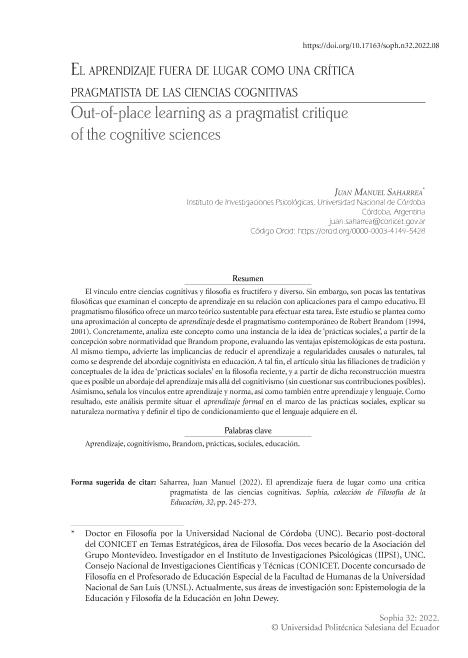Artículo
El vínculo entre ciencias cognitivas y filosofía es fructífero y diverso. Sin embargo, son pocas las tentativas filosóficas que examinan el concepto de aprendizaje en su relación con aplicaciones para el campo educativo. El pragmatismo filosófico ofrece un marco teórico sustentable para efectuar esta tarea. Este estudio se plantea como una aproximación al concepto de aprendizaje desde el pragmatismo contemporáneo de Robert Brandom (1994, 2001). Concretamente, analiza este concepto como una instancia de la idea de "prácticas sociales", a partir de la concepción sobre normatividad que Brandom propone, evaluando las ventajas epistemológicas de esta postura. Al mismo tiempo, advierte las implicancias de reducir el aprendizaje a regularidades causales o naturales, tal como se desprende del abordaje cognitivista en educación. A tal fin, el trabajo sitúa las filiaciones de tradición y conceptuales de la idea de "prácticas sociales" en la filosofía reciente, y a partir de dicha reconstrucción muestra que es posible un abordaje del aprendizaje más allá del cognitivismo (sin cuestionar sus contribuciones posibles). Asimismo, señala los vínculos entre aprendizaje y norma, así como también entre aprendizaje y lenguaje. Como resultado, este análisis permite situar el aprendizaje formal en el marco de las prácticas sociales, explicar su naturaleza normativa y definir el tipo de condicionamiento que el lenguaje adquiere en él. Además, reconoce que el pragmatismo de Brandom no explica, al menos sin un desarrollo ulterior, un tópico importante para la educación: cómo los individuos ingresan a las prácticas sociales. The relationship between cognitive sciences and philosophy is fruitful and diverse. Nevertheless, there are few philosophical attempts to analyze the learning concept regarding its link to applications in the education field. The philosophical pragmatism provides a sustainable theoretical framework to complete this task. The aim of this study is to offer an approximation to the learning concept from the perspective of Robert Brandom’s contemporary pragmatism. Specifically, it analyzes the ‘learning’ concept as an instance of the ‘social practices’ idea based on Brandom’s proposed normativity conception. The article defends the epistemological advantages of considering learning according to this conception. At the same time, it warns about the consequences of limiting learning to causal and natural regularities, as it is the case of the cognitive approach to learning. To this end, this work determines the traditional and conceptual affiliations of the social practices idea in recent philosophy. Based on such reconstruction, it shows that a learning approach beyond cognitivism is possible (without questioning its possible contributions). Additionally, it states the relationships between learning and normativity, as well as between learning and language. As a result, the analysis allows placing formal learning within the scope of social practices, explaining its normative nature and defining how language is conditioned by it.
El aprendizaje fuera de lugar como una crítica pragmatista de las ciencias cognitivas
Título:
Out-of-place learning as a pragmatist critique of the cognitive sciences
Fecha de publicación:
01/2022
Editorial:
Universidad Politécnica Salesiana
Revista:
Sophia
ISSN:
1390-3861
e-ISSN:
1390-8626
Idioma:
Español
Tipo de recurso:
Artículo publicado
Clasificación temática:
Resumen
Palabras clave:
APRENDIZAJE
,
PRAGMATISMO
,
NEOPRAGMATISMO
,
EDUCACIÓN
Archivos asociados
Licencia
Identificadores
Colecciones
Articulos (IIPSI)
Articulos de INSTITUTO DE INVESTIGACIONES PSICOLOGICAS
Articulos de INSTITUTO DE INVESTIGACIONES PSICOLOGICAS
Citación
Saharrea, Juan Manuel; El aprendizaje fuera de lugar como una crítica pragmatista de las ciencias cognitivas; Universidad Politécnica Salesiana; Sophia; 32; 1-2022; 245-273
Compartir
Altmétricas




